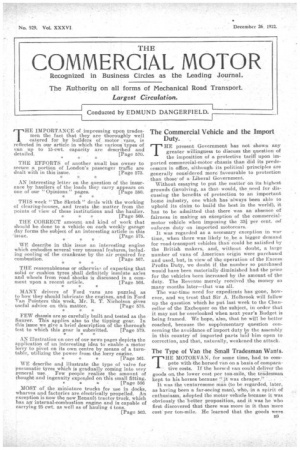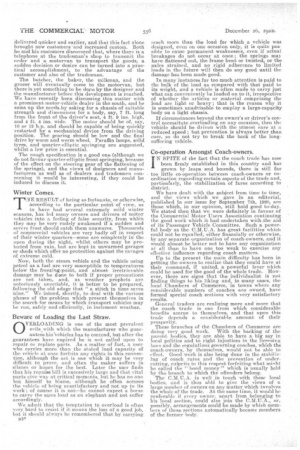The Commercial Vehicle and the Import Duty. .
Page 1

Page 2

If you've noticed an error in this article please click here to report it so we can fix it.
THE present Government has not shown any greater willingness to discuss the question of
the imposition of a Protective tariff upon imported commercial-motor chassis than did its predecessors in office, althoughits political principles are generally considered more favourable to protection than those of a Liberal Government.
Without essaying to put the matter on its highest grounds (involving, as that would, the need for discussing the benefits of protection to an important
home industry, one which has 'always been able to uphold its claim to build the best in the world), it has to be admitted that there was an absence of fairness in making an eXce,ption of the commercialmotor vehicle when imposing the .33iper cent. ad valorem duty on imported motorcars.
It was regarded as a necessary exception in war time, when there was likely to , be a bigger demand for road-transport vehicles than couldbe satisfied by the British makers, and, without doubt, a large number of vans of American origin were purchased and used, but, in view of the operation of the Excess Profits Duty, we doubt if the number so purchased would have been materially diminished had the price for the vehicles been increased by the amount of the duty. The Revenue merely received the money so many months later—that was all.
The war-time need for expedients has gone, however, and we. trust that Sir A. Holbrook will follow up the question which he put last week to the Chancellor of the Exchequer on the subject, in order that it may not be overlooked when next year's Budget is being framed. We hope, 'also, that he will be better coached, because the supplementary question concerning the avoidance of import duty lp the assembly in this country of imported parts laid him open to correction, and that, naturally, weakened the attack.
The Type of Van the Small Tradesman Wants.
HE MOTORVAN, for some time, had, to compete with the horsed van on a basis of comparative costs. If the horsed van could deliver the goods on the lower cost per ton-mile, the tradesman kept to his horses because `f,,it was cheaper." . It was the venturesome man (to he regarded, later, as having been a far-seeing man), who,-in a spirit of enthusiasm, adopted the motor vehicle because it was obviously the better proposition, and it was he who first discovered that there was more in it than -mere cost per ton-mile. He learned that the goods were 139 delivered quicker and earlier, and that this fact alone brought new customers -and increased custom. Both he and his customers discovered that, where there is a telephone at the tradesman's shop to transmit the order and a motorvan to transport the goods, a sudden decision or desire can be turned into a practical accomplishment, to the advantage of the customer and also of the tradesman. The butcher, the baker, the milkman, and the grocer will eventually come to the motorvan, but there is yet something to be dope by the designer and the manufacturer before this development is reached. We have recently been discussing this matter with a prominent motor-vehicle dealer in the south, and he sums up the needs,by asking for a chassis of suitable strength and dimensions for a body, say, 7 ft. long from the front of the driver's seat, 4 ft. 9 ins, high, and 4 ft. 4 ins. wide. The motor should be of, say, 10 or 12 h.p. and should be capable of being quickly restarted by a mechanical device from the driving position. The gearing should be low and the final drive by worm and worm wheel. Paraffin lamps, solid tyres, and quarter-elliptic springing are suggested, whilst a low price is essential. The rough specification is a good one (although we do not favour quarter-elliptic front springing, because of the effect on the steering gear of the flattening of the springs), and the views of designers and manufacturers as well as of dealers and tradesmen concerning it would be interesting, if they could be induced to discuss it.
Winter Comes.
TAT RESULT of being so fortunate, or otherwise, according to the particular point of view, as to have had several extremely mild winter seasons, has led many owners and drivers of motor vehicles into a feeling of false security, from whfen. they may be very rudely awakened if a sudden and severe frost should catch them unawares. Thousands of commercial vehicles are very badly off in respect of their winter quarters—some are completely in the open during the night-, whilst others may be protected from rain, but are kept in unwarmed garages or sheds which offer no protection against the ravages of extreme cold.
Now, both the steam vehicle and the vehicle using petrol as a fuel are very susceptible to temperatures below the freezing-point, and almost irretrievable damage may be done to both if proper precautions are net taken, and, as weather prophets are notoriously unreliable, it is better to be prepared, following the old adage that " a stitch in time saves nine." We intend, shortly, to deal with the various phases of the,probIem which present themselves in the search for means by which transport vehicles may be run, safely and efficiently, in inclement weather.
Beware of Loading the Last Straw.
OVERLOADING is one of the most prevalent evils with which the manufacturer who guarantees his 'vehicles has to contend, but after the guarantees have expired he is not called upon to repair or replace parts. As a matter of fact, a user who carries more than the stated load capacity of the vehicle at once forfeits any rights in this connection, although the act is one which it may be very difficult to prove, and often the maker suffers in silence or hopes for the best. Later the user finds that his repaips bill is excessively large and that vital parts ttive way at critical moments, but he has no one but himself to blame, although he often accuses the vehicle of being unsatisfactory and not up to its work; of course it is not—he cannot expect a horse to carry the same load as an elephant and not suffer accordingly. We admit that the temptation to overload is often very hard to resist if it means the loss of a good job, but it should always be remembered that by carrying
ale much more than the load for which a vehicle was designed, even on one occasion only, it is quite pos sible to cause permanent weaknesses, even if actual break-ages do not occur at once; the springs may
have flattened out, the frame bent or twisted, or the axles strained, and no rigid adherence to limited loads in the future will then do any good until the damage has been made good.
In many instances far too much attention is paid to the bulk of the lead as compared with that paid to
its weight, and a vehicle is often made to carry just what can conveniently be loaded on to it, irrespective of whether the articles or material comprising the load are light or heavy; that is the reason why it is sometimes una-dvisable to employ a large-capacity body on a light chassis.
If circumstances beyond the owner's or driver's control necessitate overloading on any occasion, then the
vehicle should be driven with the utmost care at a reduced speed ; but prevention is always better than cure, so do not try to break the back of the longsuffering vehicle.
Co-operation Amongst Coach-owners.
IN SPITE of the fact that the coach trade has now been firmly established in this country and has grown by leaps and bounds, there is still far too little co-operation between coach-owners or coordination regarding-certain aspects of the trade and, particufarly, the stabilization of fares according to district. We have dealt with the subject from time to time, and the views which we gave in an editorial, published in our issue for September 7th, 1920, are those which, in our opinion, still hold good to-day. We stated then that we were definitely in favour of the Commercial Motor Users Association continuing. the good work which it had undertaken with,the aid of its Passenger Vehicle Committee. Such a powerful body as the C.M.U.A. has great facilities which could not be equalled, either financially or otherwise, by any separate organization of coach-owners, and it would almost be better not to-have a-ny organization at all than to have one too weak to exercise any effective influence regarding coach matters. Up to the present the main difficulty has been in getting the owners to realize that they could have at their command, if united, a powerful lever which could be used for the good of the whole trade. However, there are signs that the individualist is not; finding things to his liking and, in many cases, the local Chambers of Commerce, in towns where any considerable numbers of coaches are owned, have formed special coach sections with very satisfactory
results. . Genera] traders are realizing more and more that the coach trade is one from which considerable benefits accrue to themselves, and that upon this trade depends a considerable amount of their prosperity.
These branches of the Chambers of Commerce are doing very good work. With the backing of the parent bodies, they are able to have a big say in local politics and to rightinjustices in the licensing laws and the regulations governing coaches, which the coach-owners, by themselves, would not be able to effect. Good work is also being done in the stabilizing of coach rates and the prevention of undercutting, culprits in this respect forfeiting what might be called the "bond money" which is usually held by the branch to which the offenders belong. The C.M.U.A. is well in touch -,,vi.th these local bodies, and is thus ablo to give the views of a large number or owners on any matter which involves the whole of the trade. At the same time, it would be preferable if every owner, apart from belonging to his local sentiOn, could also join the C.M.U.A., or, possibly, arrangements could be made by which members of these sections automatically became members of the former body,






























